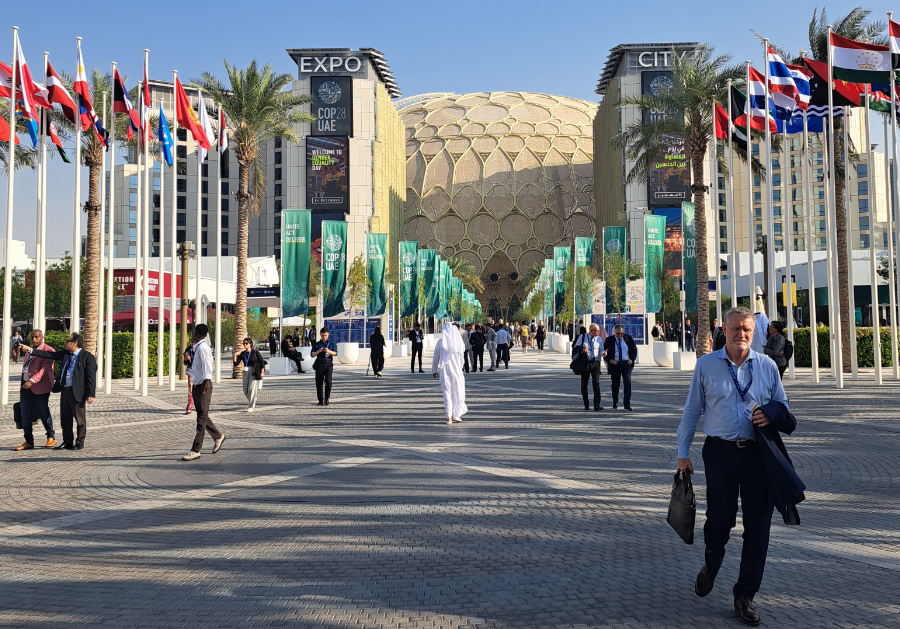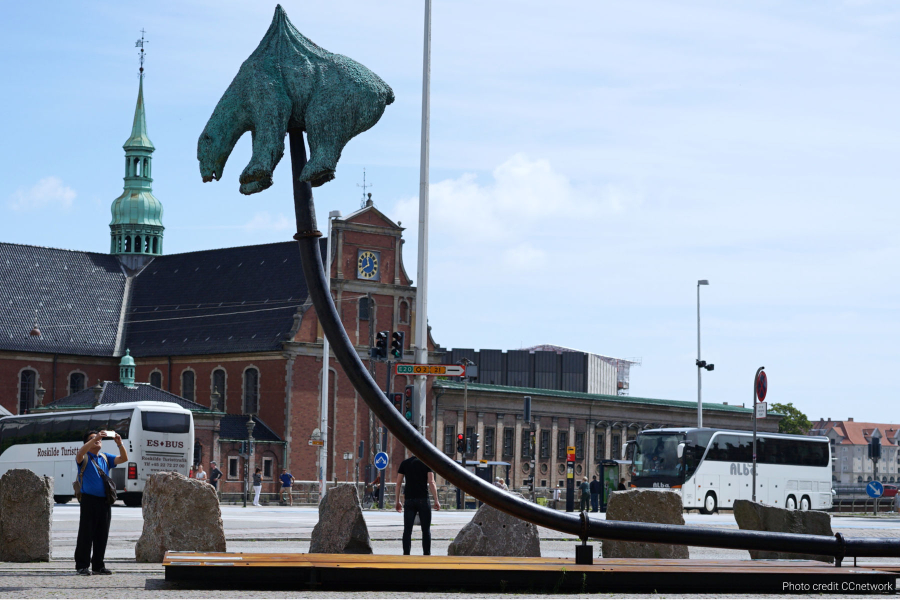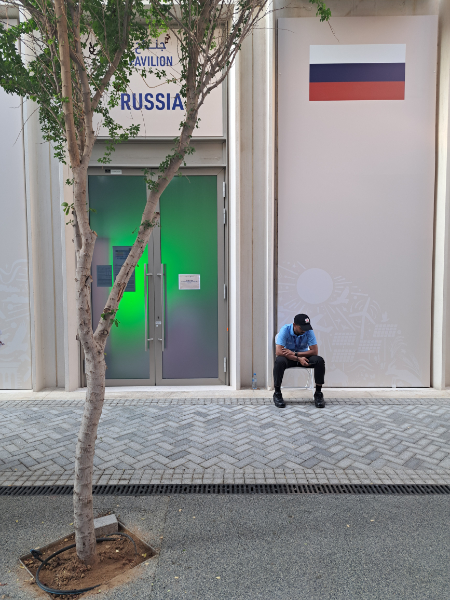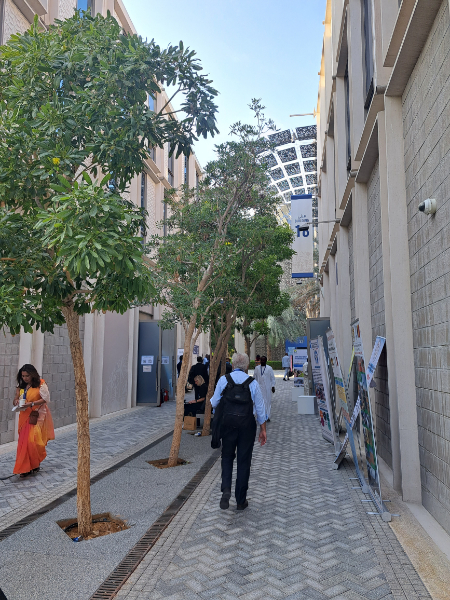Part I

- Editing of the English version Timothy Nutter -
CCnetwork: Who is dealing with the climate crisis in Russia?
Angelina Davydova (AD): At a political level, the issue of climate change has been of great importance since around 2019, when the EU has announced plans to introduce a so-called Carbon Border Adjustment Mechanism as part of the Green Deal plan. This meant that all exports from non-EU countries would be subject to an additional surcharge if they were produced in countries without a domestic price on carbon. This was a very loud wake-up call for Russia's economic and political elites, which was of great importance until the start of the war in Ukraine in 2022, but it has now lost most of its significance due to sanctions and further trade restrictions.
Another factor is the political awareness that climate is a globally important political issue, and this remains relevant during the war. And then, of course, there is the scientific community, environmental and climate activists and some environmental NGOs working on these issues, even under the ever-worsening political conditions and pressure on civil society organizations and activists.
CCnetwork: How is the situation seen in your own country?
AD: The negative consequences of climate change are visible in various forms, from Arctic warming and permafrost melting to other negative meteorological events, such as droughts in some regions, floods in other parts of the country, strong winds. And all these factors combined - the influence on exports, global strategies, climate change in the country itself - have also raised public interest in the topic. That was all in 2018-2022.
CCnetwork: Is there intensive media coverage or debate in Russia?
AD: The topic of the climate crisis has also become increasingly important in these years, so the media has also covered it more intensively than before. But since the start of the full-scale war in Ukraine, many journalists have left the country, also many climate and environmental experts, and political pressure on independent experts and activists is growing. Overall, it looks as if the topic has not completely disappeared. But it plays a much lesser role in public and media discourses than it used to.
CCnetwork: What role does social media play?
AD: Social media has traditionally been very important in Russia. And until recently, until the beginning of the full-scale war against Ukraine in 2022, these platforms were rather unregulated. Now the situation is completely different, there is a lot of control of social media, regulation, websites and social media platforms blocks and bans (many people still use VPNs). But overall, social media used to play a much bigger role than, say, in Germany because the traditional media landscape was never as strong as in most western countries. Many media outlets promoted their material online and reached audiences via social media. And that's why social media were and remain highly important for the dissemination of information.
CCnetwork: Was there any coverage of COP28 in Russia?
AD: Well, some. I was there, too, and published a number of articles in Russian myself, for example in ↗Kommersant because I thought it was an important topic and that I had to write something in Russian. Most state news agencies only gave the official Russian point of view, for example, what Russian officials said or what they reported about the visit to Dubai and their activities there. But they only gave one point of view, while some social media and blogs also presented opinions of climate experts or climate activists, for example the exile media, which also contributed analytical articles.
CCnetwork: When was the first time you attended a UN climate conference?
AD: I was there for the first time at COP14 in 2008 in Poznan, Poland. At that time, I had just completed an intensive training on climate policy and action (organized by Friends of the Earth) and had learned how climate negotiations work in theory. At COP14, I was able to see it with my own eyes.
CCnetwork: In your experience, what is the main purpose of a COP?
AD: It's mainly about political declarations and money, i.e., climate finance. By political declarations, I mean, very briefly, that countries announce their new climate targets, for example, that they want to achieve net zero or other climate declarations. Numerous declarations are signed at every COP and very often I ask myself: Why is this relevant? Most of these declarations are not legally binding and they sound very, very general. But it is often the case that things are initially written in general terms in a basic framework document, and this is how the international policy making process often works: First you need a very general document, then based on that you have to create more ambitious, legally binding documents or further national legislation. The COP level remains, therefore, very general.
CCnetwork: So what were the most important declarations at COP28?
AD: More than 130 countries announced at COP28 that they will triple their energy production from renewable sources by 2030 and invest in energy efficiency, but this is not binding. And as I said before, the issue of climate finance also plays a very important role at the COPs. This is also about the reform of international financial institutions, the way in which the World Bank or other international or multilateral financial institutions, development banks, etc. allocate money. Another important question is what is being considered as climate finance, is it just public money, donations, money from Multilateral Development Banks or also private money, loans, investments?

CCnetwork: What are the most important results of the COP as an institution?
AD: I would say the Kyoto Protocol and the Paris Agreement. Those were real achievements. Also, the fact that attempts are being made to create channels for the transfer of money from the countries of the Global North to the countries of the Global South. These channels are at least there now, although it is clear that the money is not enough. It's mainly about creating political and financial infrastructure and then trying to motivate countries, companies and everyone else to do more.
CCnetwork: What disappointed you about the COPs?
AD: When they've been really deep in the process, you're often disappointed at how slow things are. Also, on the last night, when the final COP decision is being passed, countries are still arguing over wording like fossil fuel phase-out, fossil fuel removal, fossil fuel switching. And, somehow, it's sad that this is still happening. It's sad that so much effort, time, energy, and money has been invested in a very slow process that sometimes appears from the outside to be an extremely bureaucratic process.
CCnetwork: Could you give a rough trend of the development?
AD: I think, above all, this is the creation of infrastructure, the creation of something like the Paris Agreement or important climate funds and also the motivation of countries, companies, cities, communities, all of us, to do something. Something is actually already happening and I would say that we have now reached a much higher level of climate action than in 2008.
CCnetwork: What should we make of the fact that an oil-producing country hosted the COP in Dubai?
AD: I see this as the result of an internal logic, because there is a rotation of regions at the UN. Last year with Egypt, Africa was the region, this year it was the Arab states, and Dubai said that they would do it. The choice for next year caused a lot of conflict, because first Bulgaria wanted to hold the conference, because next year it's Eastern Europe's turn, but Russia blocked it and ruled out that a European Union country could do it, because that wouldn't be neutral. Then Armenia and Azerbaijan were up for election and blocked each other for months until Azerbaijan was awarded COP29.
CCnetwork: Yes, and therefore another oil-producing country. Is a petro-bloc slowly stirring up the COP here?
AD: I guess it looks suspicious from the outside. How can a major oil-producing country organize a COP? And a second one right after? For me it's first of all part of the internal process of the COP, the rotation of regions is supposed to be impartial to all countries and regions and give everyone a voice. I don't necessarily see it as a petro-bloc. These countries are not all in the same negotiating blocs. I see more self-interest on the part of the countries - hosting a COP is a great opportunity to promote yourself as a country: “Look, we are doing something in the area of climate change.” And that was clearly visible in Dubai; other countries are also using it to their advantage. Saudi Arabia, again, a large oil-producing country, one of the largest in the world, did a lot of green advertising - here, we are investing in hydrogen, we are investing in solar energy. And Azerbaijan has also done a lot of self-promotion. I am speaking here without making any judgments or saying whether this is good or bad.


CCnetwork: What was Russia's interest at COP28?
AD: Russia was surprisingly very active at COP28, last year, just after the start of the war against Ukraine, Russia was very quiet. This year they were back, I would say. They had a lot of events with a country pavilion and an extra pavilion of the Pleistocene Park, which is a scientific experiment running in northern Yakutia.
CCnetwork: We'll come back to that. But what was the Russian strategy at this COP28?
AD: Overall, Russia's tactic may have been: Look, we are an important country, we are a very big country, and without Russia you cannot implement global climate action. Even though Russia is under sanctions now, you have to listen to our voice on climate. Strategically, they have tried to build an alliance with many countries in the Global South. The argument goes something like this: What the West, what the Global North has shown so far is its own green agenda, a climate agenda of the North. We, on the other hand, must now expand our own cooperation, more climate cooperation between the countries of the Global South, and that is what we are working on. Russia also traditionally promotes a lot of nuclear energy and nuclear energy technologies, that was another point.
CCnetwork: Which Russian players have made their presence felt?
AD: There were a lot of Russian companies at the COP, for example from the metallurgical sector or from the fertilizer sector, who are still working internationally and want to show that climate is important to them - reducing emissions, restoring ecosystems, climate action together with their international partners. Even if they can't work directly with Western companies now because of the sanctions, they want to cooperate with companies from other countries, for example with the BRICS countries and an expanded version of the BRICS countries, the BRICS+ countries. So there were a lot of business interests that brought Russian companies to the negotiations.
CCnetwork: They say Russia has also blocked it?
AD: Russia did not block anything specific or important. Everyone was worried that Russia would block something, but they were actually reluctant to do so during the negotiations themselves. However, Russia was one of the group of countries that didn't support very ambitious language like phasing out fossil fuels, but it didn't speak out very aggressively against it. It was rather quiet and the only thing that was blocked was Bulgaria's application for COP29.
CCnetwork: During COP28, we heard a lot of discussion about the fact that the host Sultan Ahmed Al-Sabah also wanted to use the opportunity for oil deals. What exactly happened there?
AD: It was widely reported, first by the Centre for Climate Reporting, BBC and other media taking part in the investigation project, then by media all around the globe. It’s an important story, because he is not only the president of COP28, but also the CEO of one of the biggest oil companies in the world. So, in a way, it was to be expected and when they actually found evidence of it and told about it, it was discussed everywhere at the COP. I think even the UN Secretary General was asked this question at his press conference about the COP, but he didn't answer it directly. He basically said, "Yeah, it's probably not a good thing." So it was sad on the one hand, but it was to be expected, and it's good that it came into the spotlight: Oil interests and fossil fuels are very much intertwined with the climate agenda these days, in one way or another.
CCnetwork: Not so long ago, the oil industry and its lobby invested a lot of money in denying climate change.What has changed?
AD: Today it's much more complicated. First of all, most energy companies now claim that they're all climate-friendly - we're all going to be net zero by 20-something, or 2040, we're doing a lot for the climate, we're investing in solar energy. And that makes it difficult for journalists doing their research to verify and evaluate these words and actions (or non-action). Dubai has clearly shown that the two agendas of fossil fuels and climate go hand in hand. They run parallel to each other at different levels, from COP level to country level, from international politics and trade to national politics and industry.
CCnetwork: One figure appears repeatedly in the media: 2456 lobbyists from the petroleum industry were at COP28. How do these lobbyists operate? Do they just network business people or what is the business of lobbyists? In relation to the media, for example.
AD: It's all rather complicated , lobbying works on various levels. On the one hand, it can be that certain companies fund certain research and then the results of that research are presented at the COP, so that's one level. And on another level, they organize their own press conferences, work with journalists and give their own presentations. Of course, they also try to influence politicians, many lobbyists work through industry associations and have their own contacts with politicians at various levels. This happens through work with the media, through paid research and through associations. I think that's the usual way lobbying works for companies.
CCnetwork: How would you describe the rhetorical work of the oil lobby at COP28?
AD: An interesting example is the final document, the outcome document of COP28, which is only a few pages long and says roughly: “We met in Dubai this year and basically agreed on the following.” And it states, and this is the good thing this year, that fossil fuels are a major cause of climate change. And it also mentions the need to move away from fossil fuels, which is also a very important formulation. But for years there has been a debate about whether we should talk about “phasing out”, which means “phasing out completely”, or “phasing down”, which just means “decreasing”. And now we have agreed on a completely different term, “transitioning away from”, which means gradually phasing out. And now all kinds of solutions are being mentioned that can be applied. But if you see all these solutions bundled together, then you are far less optimistic, because they simply include everything - including nuclear power, natural gas, carbon capture and storage. And so you see the result of the lobbying in black and white in this final document.
CCnetwork: How can manipulative terms hinder binding solutions?
AD: The language is crucial; most UN documents appear in English first. So that is the basis and then they are translated into all the other languages. So, we always must be careful what happens with the English wording, this phasing down, phasing out for example, sometimes it's just supposed to sound good without meaning much for the actual action or goals. I think that's one of the aims of lobbying here - to find words that the world is happy with. Or to bring up phrasing that looks really big. Say, there's a whole menu of climate solutions in the COP decision, but that also includes all kinds of dubious government initiatives or controversial climate solutions.
CCnetwork: What role does the phrase “energy transition” play at COP28?
AD: It plays a very important role when people talk about how we can reduce our emissions. The way to achieve this is energy efficiency and resource efficiency, less use of fossil fuels and more development of renewable energies. So, these are the familiar ways: less consumption, better and more efficient resource management and replacing one type of energy with another. This all plays a very important role and at every COP there are usually many declarations and new announcements on this, e.g., on investments in renewable energies. At COP28, around 130 countries declared that the production of renewable energy should be tripled by 2030 in their respective energy systems.
↗taz-Artikel von AD am 16.09.2023